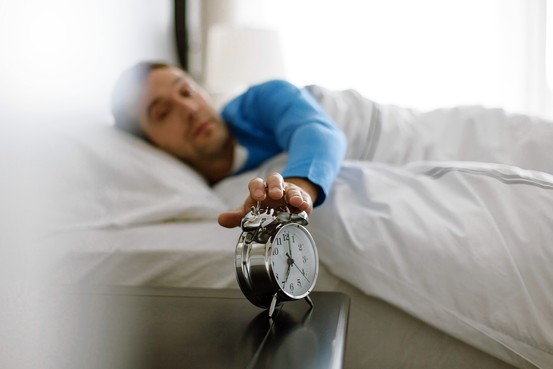(单词翻译:单击)
Lots of people rely on the beep-beep-beep of an alarm clock. And while some start the morning with a cheerful press of the off button and a catlike stretch, others wake after a whack of the snooze button and another 10 minutes of rest. But do those extra few minutes help? One expert, David Dinges, chief of the Division of Sleep and Chronobiology in the Department of Psychiatry at the University of Pennsylvania's Perelman School of Medicine, awakens the controversy.
很多人起床都要依赖闹钟铃响的哔哔声。虽然有些人的早晨是从乐呵呵地按下“关闭”键然后伸个懒腰开始的,另一些人则是猛按“小睡”键、接着再躺10分钟后才醒来的。但多睡这几分钟真的管用吗?宾夕法尼亚大学佩雷尔曼医学院(University of Pennsylvania's Perelman School of Medicine)精神病学部睡眠与生物钟学分部(Division of Sleep and Chronobiology in the Department of Psychiatry)主管、睡眠专家戴维·丁格斯(David Dinges)引发了人们对这个话题的争论。

Efficient sleep
有效睡眠
Most sleep experts agree that seven to eight hours of shut-eye per night is optimal for adults. In a 2007 paper based on the annual American Time Use Survey, Dr. Dinges found 32.6% of Americans self-reported that they got less than 7.5 hours by going to bed late, then relied on alarm clocks to wake up. Surprisingly, the result isn't a population of groggy people, but one that is getting more efficient sleep.
大多数睡眠专家都认为,每晚七到八个小时的睡眠对成年人来说是最理想的。在2007年一份基于年度“美国人时间使用调查”(American Time Use Survey)的论文中,丁格斯博士指出,有32.6%的美国人自称他们上床睡觉时间晚,每天只有不到7.5个小时的睡眠,然后得靠闹钟把他们叫醒。令人惊讶的是,这么做的结果并非导致这些人整天睡不醒、头昏眼花,而是让他们获得了更多的有效睡眠。
'Assuming you're healthy, you fall asleep faster when you're sleep deprived,' Dr. Dinges says. 'You move less, you're harder to awaken, you sleep more intensely.' Eventually the body will reset itself to a healthy state of normal sleep patterns, in what is called the homeostatic response. 'This is all fine, but it only works when you have time to recover with longer sleep every few days, which most people don't,' Dr. Dinges says.
丁格斯博士说:“假设你很健康,当你睡眠不足的时候你就会更快地入睡。你翻动得更少了,更难醒过来,睡得也更沉了。”最终,你的身体会重新调整至正常睡眠模式的健康状态,这个过程被称为体内平衡反应。丁格斯博士说,“这些都没问题,但它只会在你有时间恢复的情况下──也就是你每隔几天就多睡会儿──才会起作用,而这个大多数人都做不到。”
You Snooze, You Win
再小睡一会儿,你赢了
Heavy sleepers and sleep-deprived people use the alarm clock to terminate sleep unnaturally, says Dr. Dinges. When people wake up on their own it feels better, though few people do this, according to data from 136,000 Americans from 2003 to 2012 in the time-use survey.
丁格斯博士说,深度睡眠者和睡眠不足人群都在用闹钟终结睡眠,这并不合乎自然规律。当人们睡到自然醒再起床时,他们的感觉才会更棒。但据2003 年至2012年“美国人时间使用调查”的数据显示,能够做到这一点的人寥寥无几。该调查的数据采集来自136,000名美国人。
Most people aren't getting more sleep when they snooze -- just more time to awaken, Dr. Dinges says. 'It feels like a blissful dream state because the closer you get to wakening, the more rapid-eye movement and dreams occur,' he explains. 'Snoozing is not a great evil. The extra 10 minutes you get by snoozing can actually help to gently awaken the mind, rather than jolt it back to wakefulness,' he says.
丁格斯博士说,大多数人在“再小睡一会儿”的时候都无法获得更多的睡眠──只是徒增了醒过来的时间。他解释称:“那就像一个幸福的梦境状态,因为你越临近醒来,就会进行越多的快速眼动,做的梦也越多。再睡一会儿也不是个大恶习。你通过赖床贪睡争取到的这额外10分钟其实会有助于让头脑轻缓地醒过来,而不是让它猛地一下子清醒过来。”
Aging Out
年纪大了,贪睡少了
As people age, studies show that they need less sleep and can awaken alert more rapidly, Dr. Dinges' says. So even snooze-addicts can look forward to natural sleep patterns returning as they get older. 'When I was in my 20s, I'd use multiple alarm clocks and snooze away, but now I'm in my mid-60s, so I don't need that much sleep anymore,' he says. He very rarely hits the snooze button, he says.
丁格斯博士说,研究表明,随着人们年岁增高,他们所需的睡眠时间会越来越少,而且会更快地警醒过来。所以就算是嗜爱闹铃响后小睡的人在他们老去的时候也能期望自然睡眠模式的回归。他还说:“在我20多岁的时候,我得用上多个闹钟,可还是会瞌睡过去。但现在我都60多了,所以不再需要那么多的睡眠了。”丁格斯博士称,如今他很少会去按“小睡”键。
The Prime-Time Cure
黄金时段疗法
In an ideal world, Dr. Dinges says, people would go to sleep a little bit earlier and not use an alarm clock at all. He would like to see TV networks schedule prime-time shows earlier. He encourages his patients to go to bed when they are tired, not when they fall asleep on the couch beside Jimmy Kimmel. 'In studies in our lab, we've seen sleep restriction lead to weight gain,' he says. 'Other studies have shown a connection between reduced sleep time and morbidity illness such as diabetes and heart disease.'
丁格斯博士说,在一个理想的世界中,人们应该稍微早点儿上床睡觉,而且根本不用闹钟。他希望能看到这一幕:电视台把黄金时段播出的节目往前排一排。他鼓励自己的病人在累了的时候就上床睡觉,不要等到吉米·坎摩尔(Jimmy Kimmel)的晚间节目开演、自己却在沙发上睡着的时候再爬上床去。他说:“在我们实验室的一些研究中,我们已经发现,睡眠不足会导致体重增加。其他的一些研究则已显示出在睡眠时间减少与诸如糖尿病、心脏病这类疾病发病率之间的关联。”
Faking the brain into thinking it is getting more sleep by snoozing is a temporary cure, but it doesn't help in the long term. 'You'd be better off getting that extra 10 to 20 minutes of real sleep rather than doing that dance with the alarm clock,' says Dr. Dinges.
骗大脑说,再睡一会儿能让自己获得更多的睡眠,短期内可能是个方法,但从长期看来没什么用。丁格斯博士说:“踏踏实实多睡上10到20分钟,而不是在闹钟响后再翻来覆去折腾好一会儿,你的状况才会变得更好。”


